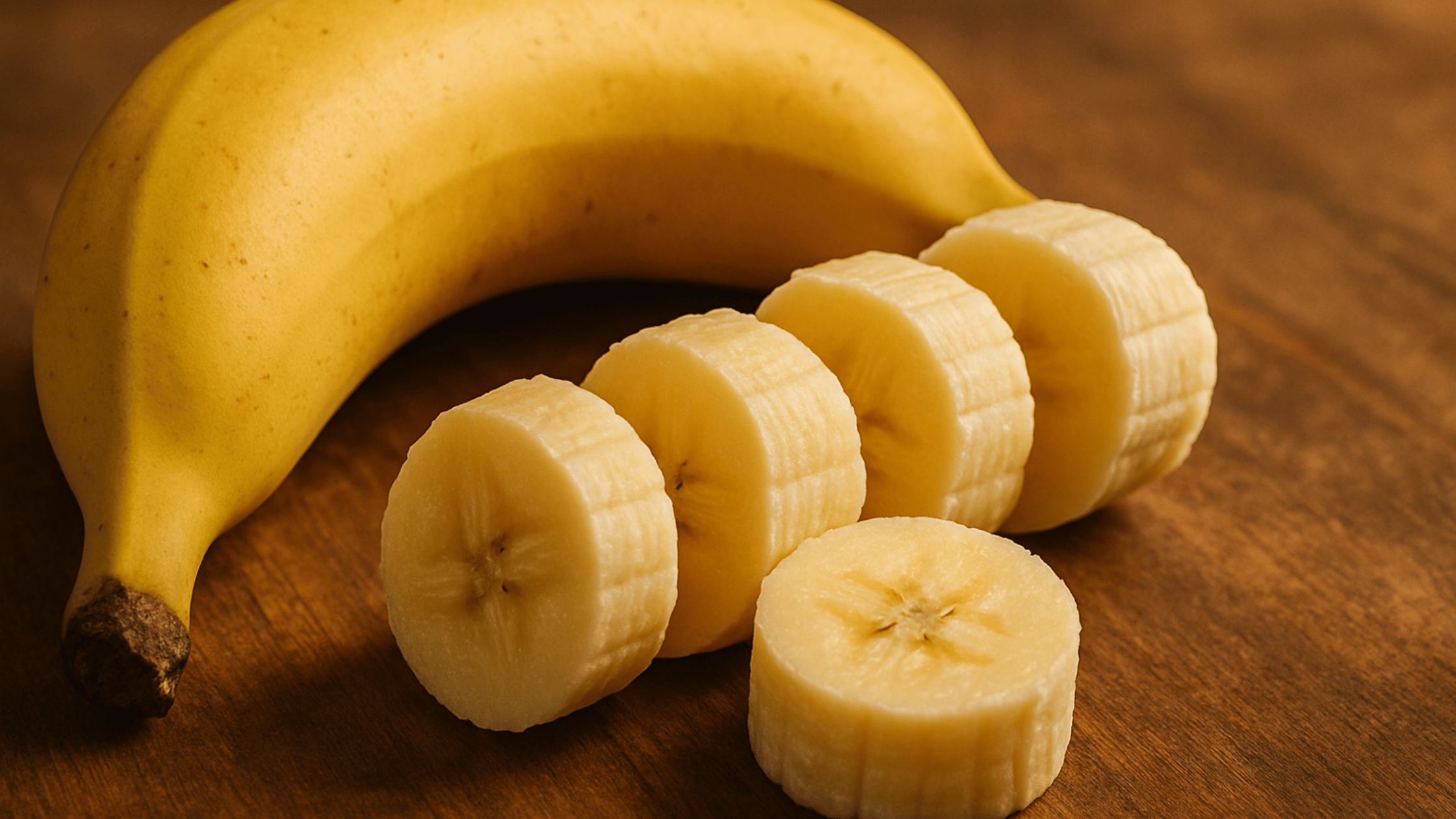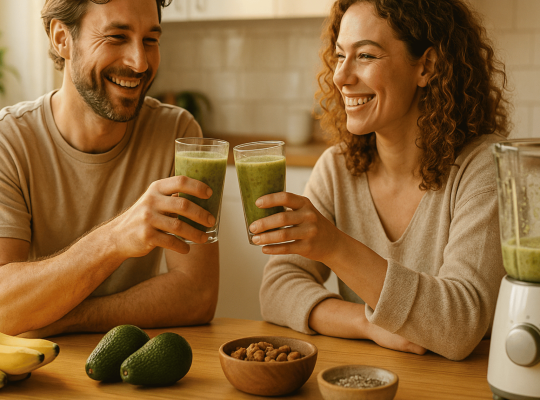Nutrition facts for banana go far beyond calories and carbs. This familiar yellow fruit is packed with dietary fiber, essential vitamins, natural sugars, and potassium—making it a dietary staple in every continent. From digestive health to post-workout fuel, bananas are one of the most nutrient-dense, affordable, and versatile fruits available.
But to get the most out of bananas, it’s important to understand how their nutritional value changes with ripeness, how they fit into special diets, and how to prepare and store them to preserve their benefits.
In this guide, we’ll explore a detailed breakdown of nutrition facts for banana, along with the numerous health benefits, unique bioactive compounds, and practical ways to include them in your meals—plus answer frequently asked questions.

Nutrition Facts for Banana: Macronutrient Breakdown
Let’s begin with the standard nutrition profile for a medium-sized banana (about 118g):
- Calories: ~105 kcal
- Carbohydrates: 27g
- Natural Sugars: ~14g
- Dietary Fiber: ~3g
- Protein: ~1.3g
- Total Fat: ~0.3g
- Water Content: ~74%
- Glycemic Index: 42–62 (varies with ripeness)
Bananas are considered a high-carbohydrate fruit, primarily because of their natural sugar content—fructose, glucose, and sucrose. However, their fiber content (especially in slightly green bananas) helps moderate blood sugar response, making them suitable for most diets when portioned properly.
Nutrition Facts for Banana: Micronutrient Profile: Vitamins and Minerals
Bananas are more than just sugar and starch—they’re also rich in several critical micronutrients:
1. Potassium (~422 mg per medium banana)
Potassium plays a vital role in regulating fluid balance, nerve impulses, and muscle contractions. It also helps counteract sodium’s effect on blood pressure.
2. Vitamin B6 (~0.4 mg)
Essential for brain function, metabolism, and the production of neurotransmitters like serotonin and dopamine.
3. Vitamin C
Acts as an antioxidant and supports immune health, skin regeneration, and iron absorption.
4. Magnesium
Supports muscle function, sleep quality, and bone health.
5. Manganese
Involved in bone development and nutrient metabolism.
6. Folate, Riboflavin (B2), Niacin (B3)
Crucial for energy production and red blood cell function.
Bananas also contain trace amounts of zinc, copper, and iron—making them a surprisingly well-rounded source of daily nutrients.
Nutrition Facts for Banana: Health Benefits of Bananas Backed by Nutrition
1. Promotes Heart Health
Thanks to their high potassium and low sodium content, bananas can help regulate blood pressure and reduce strain on the cardiovascular system. The fiber content may also lower LDL cholesterol levels.
2. Supports Digestive Function
Bananas are easy to digest and contain both soluble and insoluble fiber, helping to regulate bowel movements and relieve constipation naturally.
Unripe bananas, in particular, contain resistant starch, which acts like prebiotic fiber—feeding beneficial gut bacteria and improving gut health.
3. Aids in Weight Control
With about 100 calories and zero fat, a banana is a satisfying, nutrient-rich snack. The fiber and water content promote satiety, which helps reduce overall calorie intake throughout the day.
4. Helps Regulate Blood Sugar Levels
Despite their sugar content, bananas have a moderate glycemic index. The fiber slows digestion and sugar absorption. Eating slightly green bananas (lower GI) or pairing them with protein or fat can further reduce blood sugar spikes.
5. Boosts Mood and Brain Function
Bananas contain tryptophan, an amino acid converted into serotonin in the brain. Combined with vitamin B6, which supports neurotransmitter function, bananas may help improve mood, reduce anxiety, and support cognitive function.
6. Provides Natural Energy
The natural sugar and carbohydrate combination in bananas makes them a perfect pre-workout or mid-day energy booster. Unlike processed sugars, they provide sustained energy without a crash.
7. Supports Immune Health
Vitamin C, along with antioxidants like dopamine and catechins, helps combat oxidative stress and reduce inflammation—supporting immune resilience.
8. May Help Muscle Cramps and Recovery
The potassium and magnesium in bananas are essential for muscle relaxation, reducing exercise-induced cramping, and aiding recovery after physical activity.
Explore our full guide to the nutrition facts for cucumber:
Nutrition Facts for Cucumber: Hydration, Health Benefits, and Weight Loss Value
Bananas and Ripeness: How Nutrition Changes Over Time
The nutrition facts for a banana vary depending on how ripe the fruit is:
Green Bananas (Unripe)
- High in resistant starch
- Low sugar
- Lower glycemic index
- Better for blood sugar control and gut health
Yellow Bananas (Ripe)
- Sweeter due to converted starch
- Higher in antioxidants
- Easier to digest
Spotted Bananas (Very Ripe)
- Highest sugar content
- Richest in antioxidants
- Ideal for baking or smoothies
Each ripeness level serves different dietary needs. Choose green bananas for slow-digesting carbs, yellow for a balanced energy snack, and overripe bananas when you need a quick sugar boost or want to bake.
Compare with our deep dive on nutrition facts for avocado:
Nutrition Facts for Avocado: A Complete Guide to this Nutrient-Dense Superfood
Nutrition Facts for Banana: How Bananas Fit into Special Diets
Low-Carb/Keto Diets
Bananas are generally too high in carbohydrates for strict keto plans. However, small portions of green bananas may be used cautiously in modified low-carb diets.
Diabetic Diets
With careful portion control and pairing with fat or protein, bananas can be part of a diabetic-friendly meal plan—especially underripe ones.
Plant-Based/Vegan Diets
Bananas are an excellent source of potassium, vitamin B6, and natural energy in plant-based diets. They’re also a healthy egg substitute in baking.
Paleo/Whole30
Bananas are allowed on both diets as a whole, unprocessed fruit. They’re often used in smoothies, snacks, and clean desserts.
Weight Loss Diets
Their satiety, low calorie count, and fiber content make bananas a great option for those trying to manage weight without sacrificing nutrition.
Common Banana-Related Allergies and Concerns
While rare, bananas may trigger allergic reactions in people with latex-fruit syndrome. This cross-reactivity can cause itching, swelling of the mouth, or more serious reactions.
Those with chronic kidney disease may also need to limit banana intake due to their high potassium content, which could affect electrolyte balance.
Eating too many bananas may contribute to excessive sugar intake or unbalanced meals, so moderation—1–2 bananas a day—is typically best.
Storage Tips for Bananas
- Ripen bananas at room temperature. To speed ripening, place them in a paper bag.
- Refrigerate once they’re ripe to slow further ripening. The peel may darken, but the fruit inside stays fresh.
- Freeze ripe bananas (peeled and sliced) for smoothies, baking, or banana “ice cream.”
- Prevent browning of cut bananas by brushing with lemon juice or storing with an airtight seal.
Creative Ways to Include Bananas in Your Diet
Bananas can be eaten on their own or added to various recipes:
- Sliced over oatmeal or yogurt
- Blended into smoothies with spinach, protein, or nut butter
- Mashed into pancake or muffin batter
- Chopped into fruit salads
- Used as a natural sweetener in energy bars or banana bread
- Frozen and blended for dairy-free “nice cream”
They’re also portable and shelf-stable—perfect for on-the-go snacks or school lunches.
Frequently Asked Questions (FAQs)
Q: Are bananas good or bad for weight loss?
A: Bananas are great for weight loss when eaten in moderation. They’re low in calories, high in fiber, and promote fullness.
Q: How many bananas can I eat per day?
A: For most healthy adults, 1–2 bananas per day is safe and beneficial.
Q: Do bananas raise blood sugar quickly?
A: Ripe bananas have a moderate GI. Pairing them with protein or fat helps stabilize the sugar response.
Q: What’s the best time to eat bananas?
A: They’re excellent pre-workout (for energy) or in the morning (for digestion and mood). Avoid late-night snacking if you’re sensitive to sugar.
Q: Are bananas constipating or helpful for digestion?
A: Bananas can relieve constipation, especially when ripe. Green bananas may firm stools and help with diarrhea.
Q: Do bananas cause bloating?
A: Bananas are usually gentle on digestion. In rare cases, sensitive individuals may experience mild bloating due to resistant starch or FODMAP content.
Final Thoughts: Why Nutrition Facts for Banana Make It a Superfruit
The nutrition facts for banana make it one of the most balanced, accessible, and beneficial fruits available today. Whether you’re looking for a clean energy source, gut-friendly fiber, or a heart-supportive snack, bananas deliver impressive nutritional value in every peel.
Their adaptability across ripeness stages, compatibility with virtually all diets, and natural nutrient density make bananas a smart choice year-round. Keep them in your kitchen, your gym bag, or your lunch box—and enjoy the daily benefits of this golden fruit.







